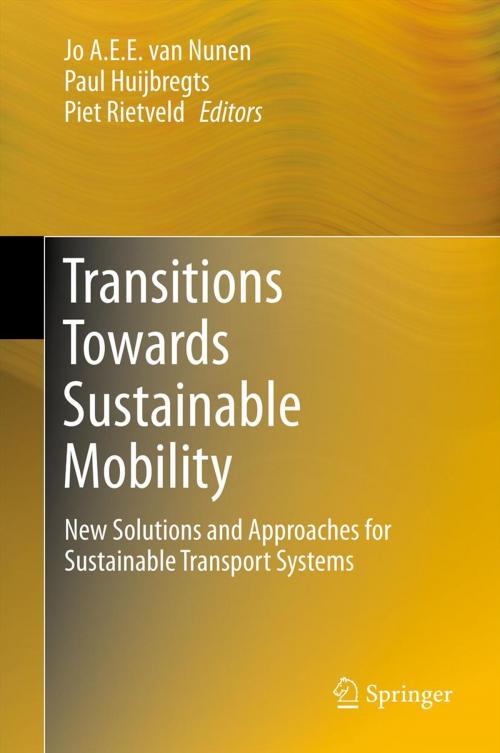Transitions Towards Sustainable Mobility
New Solutions and Approaches for Sustainable Transport Systems
Business & Finance, Economics, Urban & Regional, Management & Leadership, Production & Operations Management| Author: | ISBN: | 9783642211928 | |
| Publisher: | Springer Berlin Heidelberg | Publication: | August 19, 2011 |
| Imprint: | Springer | Language: | English |
| Author: | |
| ISBN: | 9783642211928 |
| Publisher: | Springer Berlin Heidelberg |
| Publication: | August 19, 2011 |
| Imprint: | Springer |
| Language: | English |
Delivering a sustainable transport system is not just a matter of adopting a number of technological innovations to improve performance in terms of people, planet, and profits. A broader structural and societal transition is needed in technology, as well as in institutions, behavioural patterns, and the economy as a whole. In this broader view, neither the free market nor the public sector will be the unique key player in making this transition happen. Elements of such an approach are presented in this book in a number of domains: integrating transport infrastructure and land use planning, thus connecting fields that are rather unconnected in day-to-day policies; experiments with dynamic transport optimization, including reports on pilot projects to test the viability of transitions; towards reliable transport systems, describing a reversal from supply-driven towards demand-driven approaches; and sustainable logistics and traffic management, from ‘local’ city distribution to global closed supply chain loops.
Delivering a sustainable transport system is not just a matter of adopting a number of technological innovations to improve performance in terms of people, planet, and profits. A broader structural and societal transition is needed in technology, as well as in institutions, behavioural patterns, and the economy as a whole. In this broader view, neither the free market nor the public sector will be the unique key player in making this transition happen. Elements of such an approach are presented in this book in a number of domains: integrating transport infrastructure and land use planning, thus connecting fields that are rather unconnected in day-to-day policies; experiments with dynamic transport optimization, including reports on pilot projects to test the viability of transitions; towards reliable transport systems, describing a reversal from supply-driven towards demand-driven approaches; and sustainable logistics and traffic management, from ‘local’ city distribution to global closed supply chain loops.















